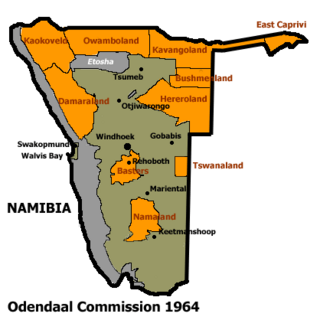
The African Union-United Nations Hybrid Operation in Darfur was a joint African Union (AU) and United Nations (UN) peacekeeping mission formally approved by United Nations Security Council Resolution 1769 on 31 July 2007, to bring stability to the war-torn Darfur region of Sudan while peace talks on a final settlement continue.
United Nations Security Council Resolution 264 was adopted on March 20, 1969, after a General Assembly resolution terminated the mandate of South West Africa (Namibia).
United Nations Security Council Resolution 276, adopted on January 30, 1970, after reaffirming previous resolutions and statements, the Council condemned South Africa's continued occupation of Namibia as illegal and decided to establish an ad hoc sub-committee to study the ways and means by which the Council's resolutions could be implemented. The Council requested all states and organizations give the sub-committee all the information and other assistance it may require and further requested the Secretary-General to give every assistance to the sub-committee.

United Nations Security Council Resolution 301, adopted on October 20, 1971, after reaffirming previous resolutions on the topic, the Council condemned the Bantustans, which they described as moves designed to destroy unity and territorial integrity along with South Africa's continued illegal presence in South West Africa.
United Nations Security Council Resolution 309, adopted on February 4, 1972, after reaffirming previous resolutions on the topic, the Council invited the Secretary-General, in close co-operation in a group of the Council composed of representatives of Argentina, Somalia and Yugoslavia, to initiate as soon as possible contacts with all parties concerned to enable the people of Namibia to exercise their right to self-determination and independence. The Council called upon South Africa to co-operate and requested the Secretary-General to report back no later that July 31, 1972.
United Nations Security Council Resolution 310, adopted on February 4, 1972, after reaffirming previous resolutions on the topic, the Council strongly condemned repressive measures against the African laborers in Namibia and called upon all nations and corporations operating in Namibia to use whatever means available to ensure that operations there conform to the Universal Declaration of Human Rights.

United Nations Security Council resolution 591, adopted unanimously on 28 November 1986, after recalling resolutions 418 (1977), 421 (1977), 473 (1980) and 558 (1984), the Council strengthened the mandatory arms embargo against apartheid South Africa imposed by Resolution 418, and made it more comprehensive. Resolution 591 sought to clarify vague terms from previous resolutions on the topic.

Namibia–South Africa relations refers to the current and historical relationship between Namibia and South Africa. South Africa captured the area now known as Namibia from Germany during World War I and governed it, by the name 'South West Africa', until 1990, when the country gained independence under the name 'Namibia'. During those 75 years, thousands of South Africans settled in the territory and South Africa treated the area as effectively a fifth province of both the Union and the Republic, imposing apartheid laws in South West Africa as it did in South Africa.

United Nations Security Council Resolution 366 was adopted unanimously on December 17, 1974, after its previous resolutions and General Assembly Resolution 2145 which terminated South Africa's Mandate over Namibia. The Security Council was concerned with South Africa's continued occupation of the territory and its brutal repression of its people.

United Nations Security Council Resolution 385, adopted unanimously on January 30, 1976, recalled previous resolutions on the topic as well as an advisory opinion of the International Court of Justice that South Africa was under obligation to withdraw its presence from the Territory of Namibia. The Resolution reaffirmed the United Nations' legal responsibility over Namibia, expressed its concern over the continued illegal actions of South Africa and deplored the militarization of Namibia.

United Nations Security Council Resolution 439, adopted on November 13, 1978, after recalling resolutions 385 (1976), 431 (1978), 432 (1978) and 435 (1978), the Council condemned South Africa for its decision to proceed unilaterally with elections in Namibia in contravention of previous resolutions. The Council considered this a clear defiance of the authority of the United Nations.

United Nations Security Council resolution 539, adopted on 28 October 1983, after hearing a report from the Secretary-General and reaffirming resolutions 301 (1971), 385 (1976), 431 (1978), 432 (1978), 435 (1978), 439 (1978) and 532 (1983), the council condemned South Africa's continued occupation of Namibia, then known as South West Africa, and the tension and instability prevailing in southern Africa as a result.

United Nations Security Council resolution 571, adopted unanimously on 20 September 1985, after hearing representations from the People's Republic of Angola, the Council recalled resolutions including 387 (1976), 418 (1977), 428 (1978), 447 (1979), 454 (1979), 475 (1980), 545 (1983) and 546 (1984), and expressed its concern at the continuing attacks on the country by South Africa through occupied South West Africa.

United Nations Security Council resolution 601, adopted on 30 October 1987, after recalling resolutions 269 (1969), 276 (1970), 301 (1971), 385 (1976), 431 (1978), 432 (1978), 435 (1978), 439 (1978), 532 (1983), 539 (1983) and 566 (1985), the council again condemned South Africa for its continued "illegal" occupation of Namibia and its refusal to comply with previous resolutions.

United Nations Security Council resolution 1594, adopted unanimously on 4 April 2005, after recalling previous resolutions on the situation in Côte d'Ivoire, particularly resolutions 1528 (2004), 1572 (2004) and 1584 (2005), the Council extended the mandate of the United Nations Operation in Côte d'Ivoire (UNOCI) until 4 May 2005.
United Nations Security Council resolution 1600, adopted unanimously on 4 May 2005, after recalling previous resolutions on the situation in Côte d'Ivoire, particularly resolutions 1528 (2004), 1572 (2004), 1584 (2005) and 1594 (2005), the council extended the mandate of the United Nations Operation in Côte d'Ivoire (UNOCI) until 4 June 2005.

United Nations Security Council resolution 1603, adopted unanimously on 3 June 2005, after recalling previous resolutions on the situation in Côte d'Ivoire, the council extended the mandate of the United Nations Operation in Côte d'Ivoire (UNOCI) until 24 June 2005.

United Nations Security Council resolution 1633, adopted unanimously on 21 October 2005, after recalling previous resolutions on the situation in Côte d'Ivoire, the Council demanded the implementation of the Linas-Marcoussis, Accra III and Pretoria peace agreements by the signatories to those accords, as well as all relevant Ivorian parties concerned.

United Nations Security Council Resolution 1647, adopted unanimously on 20 December 2005, after recalling all previous resolutions on the situations in Liberia and West Africa, the Council extended sanctions including an arms embargo, bans on the sale of diamonds and timber and restrictions on travel for certain officials.

United Nations Security Council Resolution 1712, adopted unanimously on 29 September 2006, after recalling all previous resolutions on the situation in Liberia and West Africa, particularly resolutions 1509 (2003), 1667 (2006) and 1694 (2006), the Council extended the mandate of the United Nations Mission in Liberia (UNMIL) for six months until 31 March 2007.










